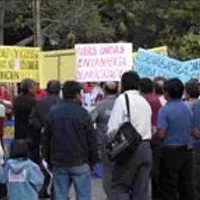In many Spanish-speaking countries, notario publicos are attorneys with authority to draft legal documents. Many new immigrants don't know that the only formal training required to be a notary public in North Carolina is a three- to six-hour class. Unscrupulous notaries often advertised as "notarios publicos" until 2002, when a law barring notaries from advertising such claims took effect.
Still, that hasn't stopped some schemers from performing legal services — whether it's charging attorney-level fees for filling out immigration forms or advising undocumented people to make frivolous asylum claims in hopes of obtaining a work permit. Only now the businesses advertise under the guise of performing "immigration services," said Ana Flynn, a Charlotte attorney who does pro bono work for the Hispanic Outreach Task Force.
Some businesses are well intentioned, but others are exploiting immigrants on society's fringe, according to advocates. Usually, their clients are new immigrants who know little English and are here illegally. They often pay as much as $5,000 to $10,000 for promises that the so-called notario simply can't deliver. Victims often feel they have little recourse. "Very few people have the courage to report these kind of things," said David Stewart, immigration services director for International House. "They're frightened out of their minds."
Some advocates say the notario problem has abated somewhat, but other frauds show little signs of lagging. Many of the most common complaints heard at the Latin American Coalition involve employers who simply won't pay.
"I couldn't believe...how many people are not getting paid for their work," said Laura Ciudad, advocacy coordinator for the publicly and privately funded coalition. What happens, she said, is one of several scenarios: Either the employer denies a paycheck, disappears, pays less than originally agreed upon, or issues a worthless check.
Ciudad said the coalition last year collected $20,000 in back pay after confronting employers on behalf of Hispanic workers. "Some of them come (only after) the fourth or fifth time it has happened to them," she said.
Speaking of News_feature2.html
-

Follow The Bouncing Ball
Jul 13, 2005 -

We Just Wanted To Learn Spanish
Jun 22, 2005 -

It's Alive!!
Jun 15, 2005 - More »
Latest in News Feature
More by Karen Shugart
-
Mecklenburg and beyond ...
Feb 10, 2009 -
Mecklenburg and beyond ...
Feb 9, 2009 -
Mecklenburg and beyond ...
Feb 6, 2009 - More »














